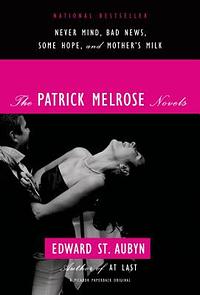Take a photo of a barcode or cover
140 reviews for:
The Patrick Melrose Novels: Never Mind, Bad News, Some Hope, Mother's Milk, and at Last
Edward St. Aubyn
140 reviews for:
The Patrick Melrose Novels: Never Mind, Bad News, Some Hope, Mother's Milk, and at Last
Edward St. Aubyn
dark
emotional
funny
reflective
slow-paced
Plot or Character Driven:
A mix
Strong character development:
Complicated
Loveable characters:
Complicated
Diverse cast of characters:
No
Flaws of characters a main focus:
Complicated
dark
emotional
sad
slow-paced
Plot or Character Driven:
Character
Strong character development:
Complicated
Loveable characters:
No
Diverse cast of characters:
No
Flaws of characters a main focus:
Yes
this book got me back into prose writing. oh how to set a scene! oh such cruel irony in everyday moments! oh the inherent humor in aristocratic melodrama! oh such shitty things! real poetry fr
challenging
dark
emotional
funny
inspiring
sad
tense
medium-paced
Plot or Character Driven:
A mix
Strong character development:
Complicated
Loveable characters:
Complicated
Diverse cast of characters:
No
Flaws of characters a main focus:
Yes
I read this New Yorker profile on St. Aubyn (https://www.newyorker.com/magazine/2014/06/02/inheritance) a few years ago, and then recalled it when I stumbled across a used and very cheap version of this compilation at Powell's last year. I'm tagging this as memoir as well as novels because the interview, as well as other things St. Aubyn has said, make clear how closely aspects of the novels hewed to his own life. I really enjoyed these for two reasons. First, St. Aubyn's prose is phenomenal. Second, he created art out of significant childhood trauma in a very psychologically savvy way. "Never Mind" and "Mother's Milk" are easily my favorite of the four, because one of St. Aubyn's unusual gifts is narrating children's interior lives in an evocative way that is both developmentally astute and respectful of their intelligence. A few quotes about developing language in "Mother's Milk" particularly bowled me over, I think because St. Aubyn shines the most when narrating a child's character not based on his own experience:
"Something had started to happen as he became dominated by talk. His early memories were breaking off, like slabs from those orange cliffs behind him, and crashing into an all-consuming sea which only glared back at him when he tried to look into it. His infancy was being obliterated by his childhood. He wanted it back, otherwise Thomas would have the whole thing." (p. 449)
"Once you locked into language, all you could do was shuffle the greasy pack of a few thousand words that millions of people had used before. There might be little moments of freshness, not because the life of the world has been successfully translated but because a new life has been made out of this thought stuff. But before the thoughts got mixed up with words, it wasn't as if the dazzle of the world hadn't been exploding in the sky of his attention." (p. 461)
It'll be interesting to read "At Last" to finish off the Patrick Melrose cycle.
"Something had started to happen as he became dominated by talk. His early memories were breaking off, like slabs from those orange cliffs behind him, and crashing into an all-consuming sea which only glared back at him when he tried to look into it. His infancy was being obliterated by his childhood. He wanted it back, otherwise Thomas would have the whole thing." (p. 449)
"Once you locked into language, all you could do was shuffle the greasy pack of a few thousand words that millions of people had used before. There might be little moments of freshness, not because the life of the world has been successfully translated but because a new life has been made out of this thought stuff. But before the thoughts got mixed up with words, it wasn't as if the dazzle of the world hadn't been exploding in the sky of his attention." (p. 461)
It'll be interesting to read "At Last" to finish off the Patrick Melrose cycle.
Easily one of the best novel series of our modern age. It is haunting and explores topics we too often shy away from. I honestly cannot recommend this series enough.
Dark, funny, tragic and utterly enthralling, St. Aubyn's book is a grand piece of work, outdone only by its author, upon whose own life it's apparently based. Four novels track the childhood (perpetual, even after decades) of Patrick Melrose, victim of child abuse, his own tendencies towards narcotics, and the possessor of all the moral fibre of a dog in heat. The characters are all larger than life; the dialogue is almost always sharp and poignantly pointed; if this series has a flaw, it's that it ends in an unsatisfactory fashion. The joy of reading it though, offsets that completely.
2.5. Niektóre fragmenty były świetne, ale często był to niestety grafomański bełkot.




